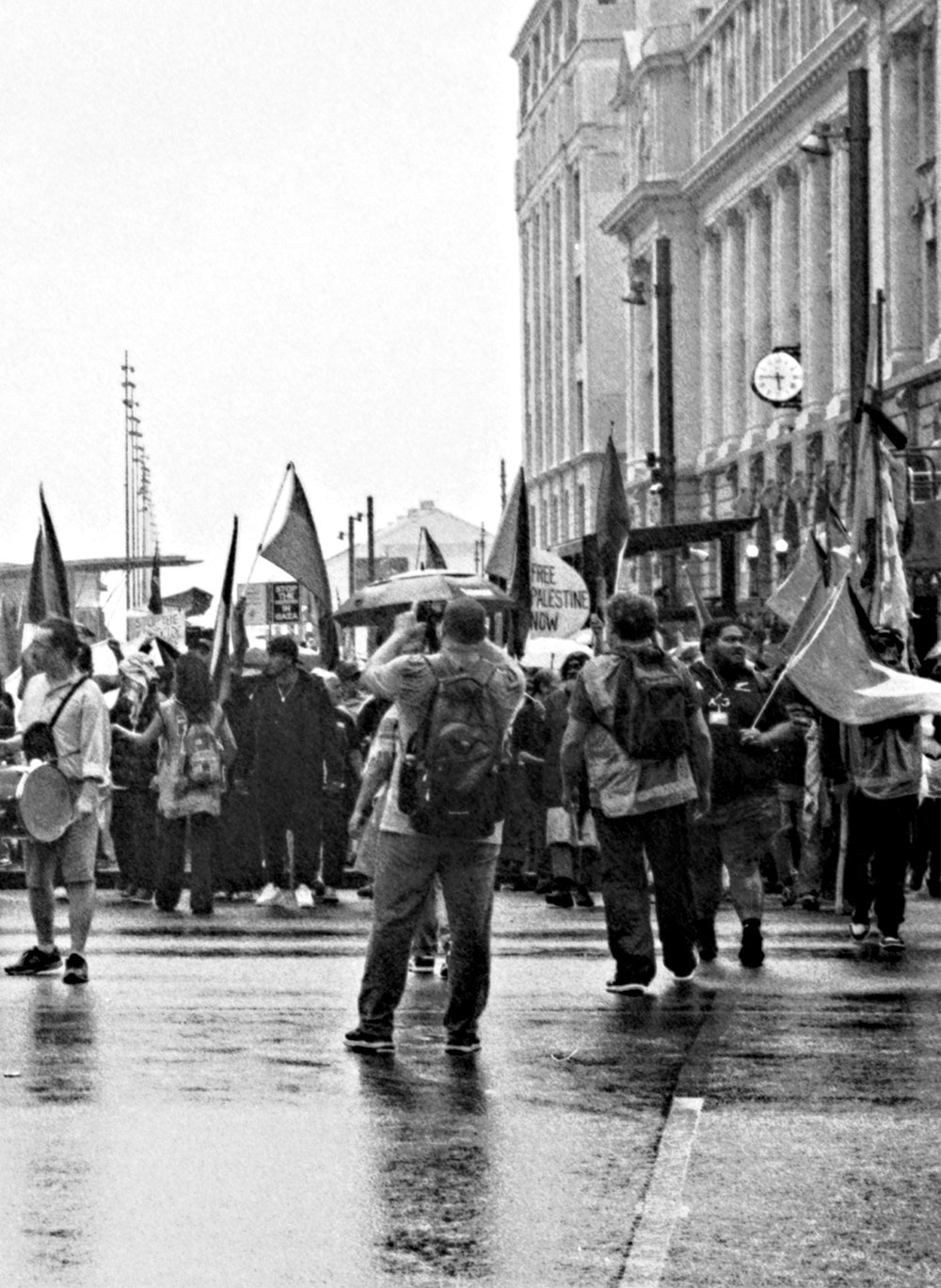

How much a dollar cost
North & South speaks with KiwiSaver providers and an ethical investment charity to understand how Israel’s war on Gaza could influence your KiwiSaver.
By Theo Macondald
Image: Free Palestine protesters in downtown Auckland march through torrential rain on January 28.
Late last November, nearly one month into Israel’s ground invasion of the Gaza Strip, high school teacher Louisa announced to her 1300 Instagram followers that she was switching her KiwiSaver to Simplicity. A Sāmoan New Zealander, who grew up under clouds of Pākehā racism, Louisa believes in Palestine’s right to self-determination. She followed the news of the Hamas-led October 7 massacres and anticipated Israel’s brutal retaliation. As Palestine’s civilian death toll steadily grew, Louisa became concerned that her KiwiSaver scheme might support companies complicit in Israel’s illegal settlements in the occupied Palestinian territories. She emailed her bank to ask whether it was reevaluating its investments in Motorola Solutions and Alstom, two multinational companies with exposure to Israel. The bank never replied, so Louisa shopped around.
Despite Simplicity not being a familiar name, like ANZ or Westpac, she was encouraged by its 8 November announcement that it was divesting its holdings in three Israeli banks it found did not reach the standards of its Responsible Investment Policy: Bank Hapoalim BM, Bank Leumi Le Israel BM and Mizrahi Tefahot Bank Ltd. Simplicity listened to its customers’ concerns and reassessed its holdings. So Louisa made the switch, then went on social media to encourage her friends and family to do the same.
Louisa’s story is that of many Kiwis. Now in her 30s, she has been contributing a portion of her paycheck to her KiwiSaver every week since she was a teenager. At 18, she was placed with a default provider, and didn’t think too much about whether this bank aligned with her values. It was a bank. Doesn’t the government make sure banks can’t invest in human rights violations? It took the recent escalation of the Israeli–Palestinian conflict (the Israel-Hamas war), and campaigns by activist groups such as the New Zealand Palestine Solidarity Network, to trigger Louisa’s recognition that her growing retirement fund might have some connection to Israel’s occupation of Palestine.
In a December article in the New York Review of Books (“A Bitter Season in the West Bank”), Israeli peace activist David Shulman reported from occupied Palestine: “At the latest count, some 20 villages in the central West Bank have been partially or entirely emptied of their inhabitants. Israeli human rights activists are doing what we can to support those who are left — we have shifts 24/7 in some of the most threatened villages in South Hebron and the Jordan Valley — but in many cases the Palestinians can simply no longer stand the [Israeli settlers’] threats, violence, and harassment.” Shulman has been advocating for Palestine for decades, but this latest violence has generated new demand for perspectives such as his, in New Zealand as much as anywhere else.
Every weekend since October 7, Kiwis have taken to the streets in protest, through Biblical rain and infernal heatwaves. Thousands have gathered in Auckland, Hamilton, New Plymouth, Wellington, Christchurch, Invercargill, Nelson, Napier and Queenstown — the list goes on — to demand an urgent ceasefire. Palestine’s death toll has multiplied many times over to an estimated 27,000 (against approximately 1500 Israeli deaths). Oxfam recently reported that Israel’s military is killing, on average, 250 Palestinians every day. Palestinian civilians who escape Israeli missiles face a bounty of humanitarian disasters: famine, disease and homelessness.
In November, a Talbot Mills poll of New Zealanders 18 and above recorded 60 per cent support for an immediate ceasefire, with 12 per cent opposed and the remainder “neutral or unsure”. Accepting that calls for an immediate ceasefire represent a pro-Palestine politic — Israel’s UN Ambassador Gilad Erdan argues a “ceasefire only serves to prolong Hamas’ reign of terror” — this poll suggests the majority of New Zealand recognises Israel’s perpetuation of this war. Following the poll, 1News reported New Zealand Jewish Council spokesperson Juliet Moses’s response that a ceasefire is only possible with the complete surrender of Hamas. Dayenu: New Zealand Jews Against Occupation co-founder Justine Sachs counters that the massive civilian deaths incurred by Israel’s pursuit of Hamas invalidate Moses’s support of a continued assault on Gaza.
For many protesters, public demonstrations are their only option to try and keep Palestinian suffering at the forefront of the public imagination. On the other hand, Canadian author Naomi Klein is one of many pro-Palestine activists who believe the most constructive tool for opposing Israel’s occupation of Gaza is the international community’s financial agency. In a recent Guardian article — “We have a tool to stop Israel’s war crimes: BDS” — Klein describes economic penalties as a way for global citizens to “create our own foreign policy from below, one that intervenes in the culture and economy in intelligent and strategic ways.”
Klein predominantly speaks of the Boycott, Divestment and Sanctions (BDS) movement, the much-debated Palestinian-led nonviolent campaign inspired by the successful boycotts against South African apartheid (“I ain’t gonna play Sun City!”). For consumers, BDS campaigns most visibly advocate against spending money with strategically selected Israel-based companies (SodaStream, Ahava) and multinational companies perceived to be either complicit in Israel’s illegal settlements in occupied Palestine (Motorola Solutions, Caterpillar) or supporting Israel’s military forces in this latest war (McDonald’s, Disney+).
